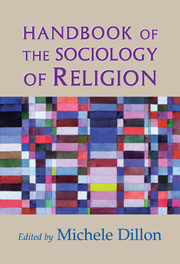Book contents
- Frontmatter
- Contents
- List of Contributors
- Acknowledgment
- Part One Religion as a Field of Sociological Knowledge
- Part Two Religion and Social Change
- Part Three Religion and the Life Course
- 12 Religious Socialization
- 13 In Rhetoric and Practice
- 14 Religiousness and Spirituality
- 15 Religion and Health
- Part Four Religion and Social Identity
- Part Five Religion, Political Behavior, and Public Culture
- Part Six Religion and Socioeconomic Inequality
- References
- Index
13 - In Rhetoric and Practice
Defining the “Good Family” in Local Congregations
Published online by Cambridge University Press: 05 June 2012
- Frontmatter
- Contents
- List of Contributors
- Acknowledgment
- Part One Religion as a Field of Sociological Knowledge
- Part Two Religion and Social Change
- Part Three Religion and the Life Course
- 12 Religious Socialization
- 13 In Rhetoric and Practice
- 14 Religiousness and Spirituality
- 15 Religion and Health
- Part Four Religion and Social Identity
- Part Five Religion, Political Behavior, and Public Culture
- Part Six Religion and Socioeconomic Inequality
- References
- Index
Summary
Throughout American history, religious institutions and families have been linked together through relationships of dependency and control. Religious leaders and organizations in the United States generally promote norms of stable, monogamous, and faithful marriage; uphold the nuclear family with children as an ideal; and provide a venue for the religious and moral socialization of children. For individuals, religious participation is associated not only with traditional family forms and practices, but also with happiness and satisfaction in marriage and parent-child relationships. Religious institutions depend on families to pass on the religious tradition and for the resources – money, time, membership – that enable them to survive (Christiano 2000; Sherkat and Ellison 1999).
The relationship between religion and family is constituted and defined by the production of religiously-based familistic ideologies. Religious familisms in the United States have varied somewhat over time and social location, but all versions have shared certain fundamental characteristics. They define the family as the precious, central organizing unit of society and teach members that conforming to normative expectations about family life is a form of patriotism, good citizenship, or moral worth (cf. Christiano 2000; D'Antonio 1980; McDannell 1986).
Because religion and family are tightly linked and interdependent institutions, rapid and fundamental changes in one institutional arena may trigger responsive changes in the other (Friedland and Alford 1991). This chapter explores the effects of recent changes in work and family on local congregations.
- Type
- Chapter
- Information
- Handbook of the Sociology of Religion , pp. 164 - 178Publisher: Cambridge University PressPrint publication year: 2003
- 14
- Cited by



